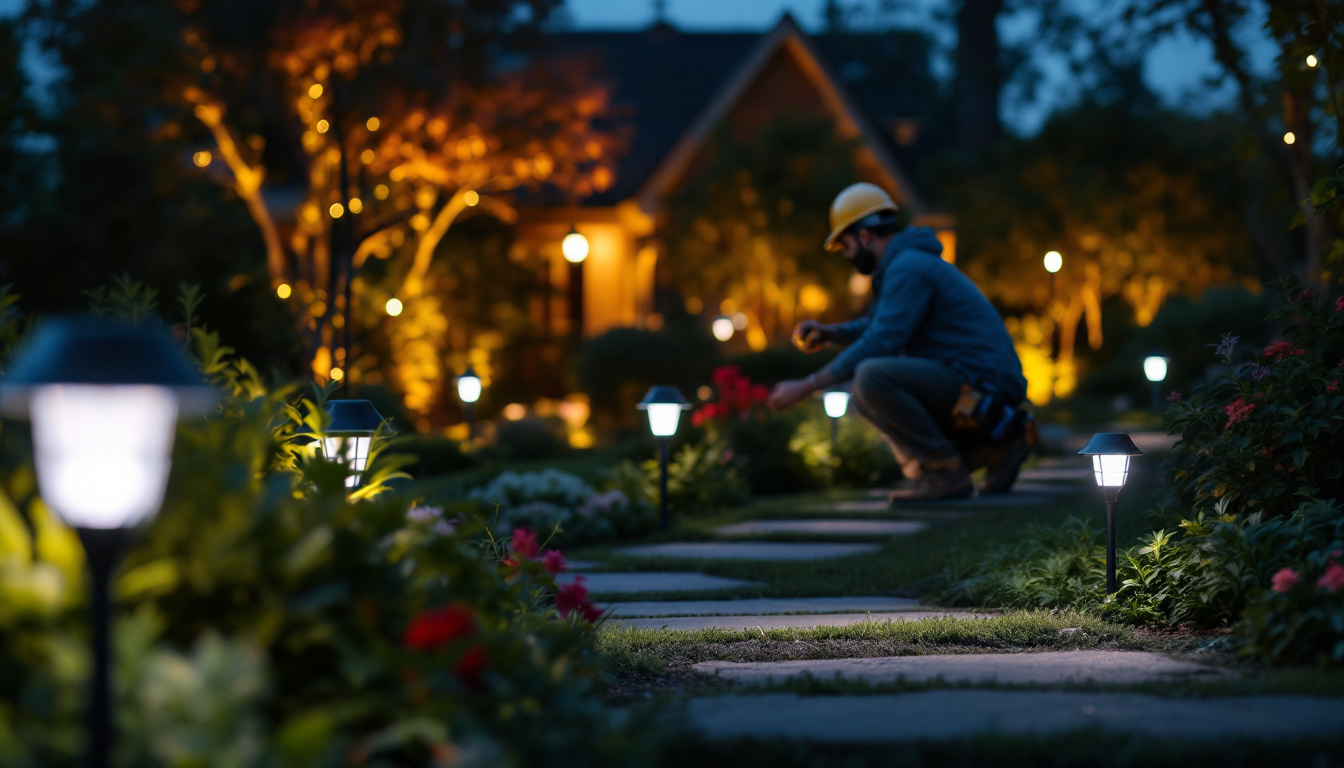
As the demand for sustainable energy solutions continues to rise, outdoor solar lights have become a popular choice for homeowners and businesses alike. For lighting contractors, this presents both opportunities and challenges. Understanding how to navigate these challenges is essential for successfully integrating solar lighting into landscaping projects. This article explores the unique hurdles faced by lighting contractors when working with outdoor solar lights and offers practical solutions to overcome them.
Solar lighting has gained traction due to its environmental benefits and cost-effectiveness. With advancements in technology, solar lights are now more efficient, durable, and aesthetically pleasing than ever before. Homeowners are increasingly looking to enhance their outdoor spaces without increasing their energy bills, making solar lights an attractive option. The ability to harness renewable energy not only reduces reliance on fossil fuels but also contributes to a lower carbon footprint, aligning with the growing trend of sustainable living.
Moreover, the versatility of solar lights allows them to be used in various settings, from residential gardens to commercial properties. This growing market creates a wealth of opportunities for lighting contractors who can provide expertise in solar lighting solutions. Whether illuminating pathways, accentuating landscaping features, or providing security lighting, solar options can be tailored to meet diverse needs, making them an ideal choice for both homeowners and business owners alike.
One of the first steps in successfully implementing solar lighting solutions is understanding the specific needs of clients. Each project comes with its unique requirements, such as the desired ambiance, functionality, and budget constraints. Lighting contractors must engage in thorough discussions with clients to gather this information. By doing so, they can recommend the most suitable products, ensuring that the lighting not only serves its purpose but also enhances the overall aesthetic of the space.
Moreover, educating clients about the advantages and limitations of solar lighting can help set realistic expectations. For instance, while solar lights are energy-efficient, their performance can be affected by factors such as sunlight exposure and battery capacity. By addressing these aspects upfront, contractors can foster trust and ensure client satisfaction. Additionally, discussing the potential for smart technology integration can further excite clients; many solar lights now come equipped with features like motion sensors and remote controls, allowing for greater convenience and energy savings. As clients become more informed about these innovations, they are more likely to appreciate the long-term benefits of investing in solar lighting solutions.
While the benefits of solar lighting are clear, contractors often encounter several challenges when integrating these systems into their projects. Understanding these challenges can help contractors devise strategies to mitigate them.
One of the primary challenges is the installation process itself. Unlike traditional lighting systems that rely on wired connections, solar lights require careful placement to maximize sunlight exposure. Contractors must assess the landscape and determine the optimal locations for solar fixtures, which can be time-consuming.
Additionally, the installation of solar lights may involve dealing with uneven terrain or existing landscaping features that obstruct sunlight. To overcome these issues, contractors should conduct a thorough site assessment before installation, identifying potential obstacles and planning accordingly. This may include utilizing tools such as solar pathfinders or shade analysis software to accurately gauge sunlight availability throughout the day and across different seasons. By investing time in this preparatory phase, contractors can ensure a more efficient installation process and enhance the overall performance of the solar lighting system.
The performance of solar lights can vary significantly based on environmental conditions. Factors such as geographic location, seasonal changes, and weather patterns can all impact the efficiency of solar lighting systems. For instance, in areas with prolonged cloudy weather, solar lights may not receive adequate sunlight to function optimally.
Contractors can address this challenge by selecting high-quality solar lights with advanced technology that enhances performance in diverse conditions. Additionally, offering clients a range of options, from basic to premium models, allows them to choose solutions that best fit their specific environmental circumstances. Furthermore, educating clients about the potential impact of local weather patterns on solar performance can help set realistic expectations and foster a better understanding of the technology’s capabilities. By providing this knowledge, contractors can build trust and ensure that clients feel confident in their investment.
Another challenge is the maintenance and longevity of solar lights. While they typically require less maintenance than traditional lighting systems, solar lights still need occasional upkeep, such as cleaning solar panels and replacing batteries. Clients may not be aware of these requirements, leading to performance issues over time.
Contractors can mitigate this challenge by providing clients with clear maintenance guidelines and offering ongoing support. Establishing a maintenance schedule can also help ensure that solar lights continue to function effectively throughout their lifespan. Additionally, contractors might consider implementing a warranty or service plan that covers routine maintenance checks, which can help reassure clients of the reliability of their solar lighting systems. By fostering a proactive approach to maintenance, contractors can enhance customer satisfaction and encourage long-term relationships, ultimately benefiting both parties in the dynamic landscape of solar lighting solutions.
To thrive in the solar lighting market, lighting contractors must adopt strategies that address the unique challenges associated with these systems. Here are some effective approaches to consider:
Staying updated on the latest advancements in solar technology is crucial for lighting contractors. Investing in training and education not only enhances knowledge but also builds credibility with clients. Workshops, webinars, and industry conferences provide valuable insights into new products and installation techniques.
Moreover, educating clients about solar technology can empower them to make informed decisions. Providing them with resources, such as brochures or online guides, can enhance their understanding of solar lights and their benefits, leading to greater client satisfaction. This educational approach can also foster trust, as clients appreciate transparency and the willingness to share knowledge. Furthermore, contractors who are well-versed in the intricacies of solar lighting can better address common misconceptions, such as concerns about efficiency during cloudy weather or the longevity of solar batteries, ultimately helping clients feel more confident in their investment.
Leveraging advanced tools and technology can streamline the installation process and improve project outcomes. For instance, using software for landscape design can help contractors visualize the placement of solar lights and assess their potential performance. Additionally, employing tools that measure sunlight exposure can aid in determining the best locations for installation.
By integrating technology into their workflow, contractors can enhance efficiency and reduce the likelihood of installation errors, ultimately leading to better results for clients. Utilizing drones for site surveys can provide a bird’s-eye view of the area, allowing contractors to identify optimal lighting placements that maximize solar exposure. Moreover, project management software can facilitate better communication and scheduling, ensuring that all team members are aligned and that projects are completed on time and within budget. These technological advancements not only improve operational efficiency but also enhance the overall client experience by delivering high-quality results that meet or exceed expectations.
Building strong relationships with suppliers is essential for contractors working with solar lighting. Reliable suppliers can provide access to high-quality products and the latest innovations in solar technology. Additionally, they can offer valuable insights into product performance and warranty options, which can be beneficial when advising clients.
Establishing partnerships with multiple suppliers can also provide contractors with a broader range of options, enabling them to tailor solutions to meet specific project requirements. This flexibility can be a significant advantage in a competitive market. Furthermore, strong supplier relationships can lead to favorable pricing and terms, allowing contractors to offer competitive quotes while maintaining healthy profit margins. Regular communication with suppliers can also keep contractors informed about upcoming product launches or industry trends, ensuring they remain at the forefront of the solar lighting market. By collaborating closely with suppliers, contractors can not only enhance their service offerings but also contribute to the overall growth and innovation within the solar lighting sector.
Effective communication with clients is vital for the success of solar lighting projects. Contractors should prioritize educating clients about the benefits, limitations, and maintenance requirements of solar lights. Open dialogue fosters trust and ensures that clients have realistic expectations throughout the project.
When discussing solar lighting options, it’s essential to set realistic expectations regarding performance and maintenance. Clients should understand that while solar lights are energy-efficient, their performance may vary based on environmental conditions. By clearly communicating these factors, contractors can prevent misunderstandings and ensure client satisfaction.
Providing clients with a comprehensive overview of the expected lifespan of solar lights, as well as potential maintenance needs, can further enhance transparency and build trust. This proactive approach can lead to long-lasting client relationships and repeat business.
To address concerns about maintenance, contractors can consider offering maintenance packages as part of their services. These packages can include regular inspections, cleaning of solar panels, and battery replacements. By providing ongoing support, contractors can help clients maintain optimal performance and extend the lifespan of their solar lighting systems.
Additionally, offering maintenance packages can create an additional revenue stream for contractors while enhancing client satisfaction. Clients are more likely to appreciate the convenience of having a dedicated maintenance plan in place, ensuring their solar lights remain functional and effective.
Outdoor solar lights present a promising opportunity for lighting contractors looking to expand their service offerings. However, navigating the challenges associated with solar lighting requires a proactive approach. By understanding client needs, addressing installation and performance issues, and fostering strong supplier relationships, contractors can successfully integrate solar lights into their projects.
Furthermore, investing in training, utilizing advanced tools, and maintaining open communication with clients can enhance overall project outcomes. By prioritizing education and support, lighting contractors can not only overcome challenges but also establish themselves as trusted experts in the solar lighting market.
Ultimately, embracing the potential of outdoor solar lights can lead to increased client satisfaction, repeat business, and a positive impact on the environment. As the industry continues to evolve, lighting contractors who adapt to these changes will be well-positioned for success.
Ready to elevate your lighting projects with the best in solar technology? At LumenWholesale, we offer contractors an exceptional range of spec-grade outdoor solar lights at unbeatable wholesale prices. Say goodbye to local distributor markups and hello to top-quality lighting that meets the highest industry standards. With our hassle-free bulk buying and free shipping, you can trust that you’re getting premium lighting solutions at the best value — all without hidden fees. Take the next step in sustainable lighting excellence and explore our collection at LumenWholesale today.

Discover the insider tips and tricks lighting contractors use to master light switch outlet covers.

Discover how Yard Light Eye is revolutionizing the future of lighting design and installation with cutting-edge technology and sustainable solutions.

Discover innovative cost-saving strategies for lighting contractors with electronic ballasts.

Discover the essential role floor lamp stores play in transforming your lighting projects from ordinary to extraordinary.